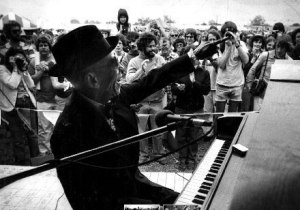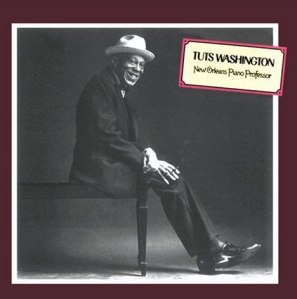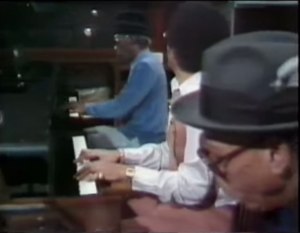The rich creative humus that nurtures New Orleans music is built upon generations of musicians who, mostly in historical anonymity, shared their art and craft with younger musicians. (Here’s the edited version of the radio based on this post.)
If not for one solo recording and a fortuitous film that captured his brilliance and his legacy, Isidore “Tuts” Washington might have easily have been lost to future audiences. But his contribution to New Orleans music will not be forgotten

Born in 1907, Washington was old enough to follow the early jazz masters perform on the streets of his hometown. Mostly self-taught on the piano, he would whistle the brass band tunes he would hear until he could work them out on the keyboard.
At an early age, he excelled in the boogie woogie, improvisational style of piano common in the New Orleans clubs called barrelhouse. He played with a number of New Orleans bands throughout the 1920’s and 3o’s, including backing up a singer whose missing front teeth got him dubbed “Smiling” Lewis.
In the late 30’s while playing in these clubs, Washington nurtured a young pianist named Roy. He even painted a charcoal mustache on his face to help him get into clubs under age so he could perform with him. Years later, Roy, otherwise known as Professor Longhair, would talk fondly of his mentor’s clean playing style and the long stretch of his fingers on the keyboards.

After the war, when the now “Smiley” Lewis began to record, first with DeLuxe Records and then with Imperial Records, Washington found himself at the vanguard of Rhythm & Blues, playing piano on songs like “Turn On Your Volume,” “Tee-Nah-Nah,” and “Gumbo Blues.” But recordings would be a rare experience for Washington who would not return to the studio again until he was deep into his 70’s.
Washington left the city and was gone for most of the J&M Studio R&B heyday. When he returned to New Orleans, he played jazz with Papa Celestin and the Clyde Kerr Orchestra and held down regular gigs at places like the Court of Two Sisters Restaurant–solidifying his reputation in the 60’s and 70’s as a New Orleans institution.
He regularly performed at the New Orleans Jazz and Heritage Festival and collapsed from heart failure while performing at the 1984 New Orleans Worlds Fair.
As mentioned above, he was a direct influence on Professor Longhair but also other New Orleans piano players, including James Booker and Allen Toussaint. This is evident when you watch this excerpt from Piano Players Rarely Ever Play Together. This film by Stevenson Palfi captures Tuts Washington and Professor Longhair near the end of their lives and Toussaint in his mid-40s.

The film features interviews and historical footage but the most exciting part of the film is the three masters playing pianos all lined up so the camera can catch them in the same shot. While the YouTube version is muddy, the film has been digitally restored.
If you don’t want to watch the whole film, skip to the end when the filmmaker shows the three playing a boogie woogie tune to its full length. The number (available on Longhair’s anthology) starts with Professor Longhair giving a little coaching, scatting a bit to describe how to avoid cutting in on his master, Tuts Washington.
Hear this amazing artist on my next show, (recording of the show) Monday at 10 a.m.

2 thoughts on “Tuts Washington holds solid place in New Orleans piano legacy”